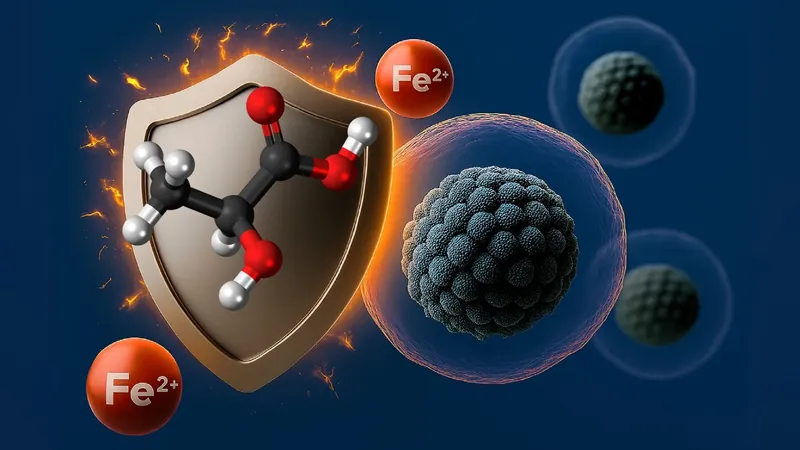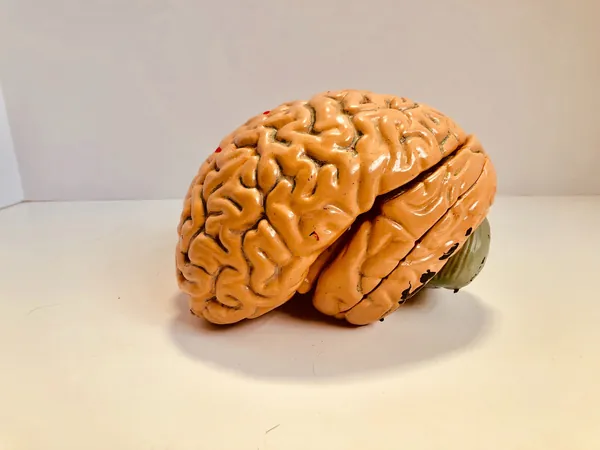
Unlocking the Secrets of Lactate: A Revolutionary Defense Mechanism Against Cell Stress
2025-09-12
Author: Yu
Lactate: More Than Just a Muscle Byproduct
While most know lactate as the molecule that builds up in muscles during intense exercise, its fascinating roles extend beyond athletics, potentially reshaping how we understand cell defense.
A New Discovery: Lactate and Iron Unite
Researchers at Essen University Hospital and the University of Duisburg-Essen have stumbled upon a groundbreaking hypothesis: lactate might collaborate with iron to form a powerful, previously unrecognized defense system against oxidative stress. This discovery could herald new opportunities in treating diseases like cancer, neurodegeneration, and inflammation.
The Dark Side of Oxidative Stress
Oxidative stress poses a significant threat to cells, triggered by harmful oxygen species, such as hydrogen peroxide (H2O2). While low levels can signal healthy cellular functions, excess H2O2 becomes a menace, damaging crucial cellular components like DNA and proteins and putting cells at risk of death.
Cellular Heroes: How Lactate Steps In
In various cell types—including tumor cells and brain astrocytes—lactate plays a vital role. These cells often hoard iron, which isn't tightly bound, allowing it to engage in chemical reactions. The hypothesis proposed by Dr. Astrid Hensel, Dr. Renáta Váraljai, and Prof. Dr. Shirley K. Knauer suggests that lactate pairs with iron to act as a shield against oxidative stress.
Sacrificial Protection: Lactate's Bold Move!
According to Knauer, lactate could 'sacrifice' itself to neutralize aggressive reactive oxygen species before they can inflict damage. This transformation turns lactate into pyruvate—a crucial resource that cells can harness for growth and repair.
Implications for Medicine: A Game Changer?
Hensel reflects on the potential clinical significance, noting, "If our hypothesis proves correct, we could manipulate this protective mechanism. For cancer treatments, for instance, we might weaken the defensive shields of tumor cells, making them more vulnerable to therapies."
The Road Ahead: A New Frontier in Cell Biology
As research in this area unfolds, the implications for medicine could be revolutionary. Understanding how lactate and iron interact may lead to innovative strategies to fortify our cells against stress, paving the way for novel treatment options across a spectrum of diseases.




 Brasil (PT)
Brasil (PT)
 Canada (EN)
Canada (EN)
 Chile (ES)
Chile (ES)
 Česko (CS)
Česko (CS)
 대한민국 (KO)
대한민국 (KO)
 España (ES)
España (ES)
 France (FR)
France (FR)
 Hong Kong (EN)
Hong Kong (EN)
 Italia (IT)
Italia (IT)
 日本 (JA)
日本 (JA)
 Magyarország (HU)
Magyarország (HU)
 Norge (NO)
Norge (NO)
 Polska (PL)
Polska (PL)
 Schweiz (DE)
Schweiz (DE)
 Singapore (EN)
Singapore (EN)
 Sverige (SV)
Sverige (SV)
 Suomi (FI)
Suomi (FI)
 Türkiye (TR)
Türkiye (TR)
 الإمارات العربية المتحدة (AR)
الإمارات العربية المتحدة (AR)